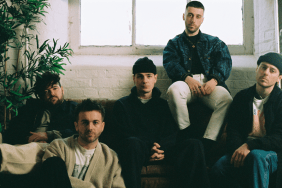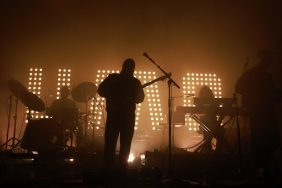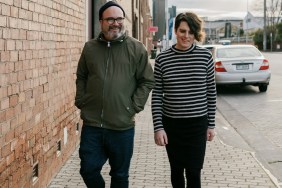As a musician, it’s never easy to escape the trappings of a successful former band. Just look at Audioslave’s rather mediocre career (given the talent that was on display there), or the constant speculation over whether Led Zeppelin will reunite for a world tour.
David McCormack is perhaps best known as the charismatic and slightly goofy leader of successful Australian band Custard, but that particular project has been defunct now for almost ten years. It hasn’t seemed to bother him in the slightest though, as he’s been keeping himself busy with a variety of projects.
Between composing film scores and keeping up to date with all the latest technology, he’s found the time to release two albums with The Titanics (now also disbanded) as well as three solo albums, two with the help of his backing band The Polaroids. With a new album, Little Murders, to be released soon, Daniel Clarke sat down with McCormack recently to find out exactly what he’s been up to.
Music Feeds: What’s been happening?
David McCormack: O.k. I’ll give you the brief roundup. In 2004 I put out my last solo album but I’ve been recording all the time and just kept not releasing stuff. So the end of last year I thought, “right, that’s it”. I kept a few of the old songs and did a whole stack of new ones and here we are, it’s out. It’s hard to release albums these days, what I was doing was just burning disks and giving them to my friends. It’s nice to put an album out though, because then you get the artwork.
MF: And sure enough soon you’ll see yourself on the Aria charts?
DM: Yeah <laughs>. Definitely top ten.
MF: You say you’ve been writing and recording the last four to five years, have you been touring much?
DM: Yeah, the last spell of gigs was like two or three years ago but now I’m about to get a whole new bunch happening. There should be about six months of shows coming up. I’ve been doing a lot of production work with bands recently. I’ve been doing a few film soundtracks. The more I do the more people seem to want to have me do stuff. I guess that’s why I haven’t been rushed to put an album out, because I’ve been releasing stuff in different forms. I’m very excited about iTunes, to have the whole album on iTunes. This might be the last CD I release.
MF: What do you think of the whole online revolution?
DM: I think it’s great. From my point of view, I can get my album up on iTunes and anyone anywhere in the world can download it. Surely in not too long a time it’s going to be all downloads. People still like a little bit of a physical thing though. For an old man I’m very cyber-savvy. I have a Facebook and a Myspace. I don’t have a Twitter account yet though.
MF: How was doing the film scores? Is there a bit of a disconnect between you performing the songs and them being heard?
DM: It’s completely different to releasing an album or doing a gig. The first one I did was in about 2002. I thought “I don’t know how to do this, all I know how to do is play indie rock music.” I just did my own thing and once I realised they were happy with what I was doing I thought it was a really good thing to do. It’s just something I fell in to.
MF: So are you still living in Brisbane?
DM: No, I moved to Sydney about ten years ago. Custard was always Brisbane-based and then about three of us moved to Sydney and the band broke up, about ten years ago. I’ve just been hanging around doing gigs and records with the new band Polaroids and doing films and stuff. My heart’s still in Brisbane though. I always go up there and visit the family and stuff. I’ve got a new niece so that’s another reason to go up there.
MF: Was it hard to escape the Custard tag?
DM: People who know Custard will always have a certain expectation of what I do but I guess after Custard, when we were quite popular, it took me a little bit of time to be surprised like: “hang on, why aren’t there a thousand people at our gig? Why aren’t we selling so many records?” But after a while you get used to it. I’ve put out this album, sixty minutes, it’s quite long. I split it up into four groups of five songs to mimic the four sides of a vinyl record. Being more of an underground thing now, it’s good because I don’t have to please anyone except myself.
MF: Has the new album still got that fine balance between true indie rock and the lighter side of things?
DM: I think it does. As much as I would ever try and get away from that, it’s always a part of me. A little bit of the lighter stuff, the indie stuff, the heavier stuff. Whatever I wanna do. There’s twenty songs on there I’m sure someone will like some of them. And with iTunes you can just get the ones you like. Remember in the old days you’d hear a song on the radio and then you go out and buy it? You go to the shop, bring it home, it’d all take a couple of hours minimum. Now I see people complaining “oh god, I’m going to have to wait five minutes to get this song”. It’s incredible how we get used to everything being fast. But in a world where everyone’s getting faster, I’m getting slower. To release an album every four or five years is not too fast.
MF: Do you feel under pressure to produce more?
DM: Nah. Only in myself. 2004-2009, that’s a long time for an album. Hopefully it won’t be that much wait till the next one. Who knows what the format for the next one will be. Microchips or whatever. On iTunes you don’t have the physical thing. That’s why I sort of went, not over the top, but I made sure to put a lot into the booklet, it’s quite thick and there’s a few bits and pieces in there for people.
MF: Talking about that difference between old school, physical albums and new downloads, do you have a similar take on working with older analog equipment vs digital?
DM: Yeah I embrace whatever. In the studios that I record in there’s some analog stuff and some of the more digital stuff. It’s just a matter of what kind of sound you can get out of it. I’m a great improviser as well, if there’s a shitty old Casio and a snare drum I could probably make something out of it. I love the sounds of machines almost breaking. Like a really old guitar or keyboard, they make sounds that nothing else will make.
MF: Do you ever run out of inspiration? Is there ever a time when you think that maybe you’ll stay away from music for a while?
DM: Over the lats few years I’ve met so many musicians in so many studios it sort of re-inspires the music process for me. Like if I meet someone who plays an instrument I don’t know how to play that just makes so many opportunities. How could I record a song with that person playing? So it pushes me in different ways. It’s better like that, better than being the same old band with the same old people doing the same old tricks. Though with my current band The Polaroids, the people who play in that band are just fantastic.
David McCormack and the Polaroid’s new album Little Murders will be in stores soon through Das Kong records. For a quick fix of McCormack-isms in the mean time, head over to his myspace page and check out the blogs. Priceless.












